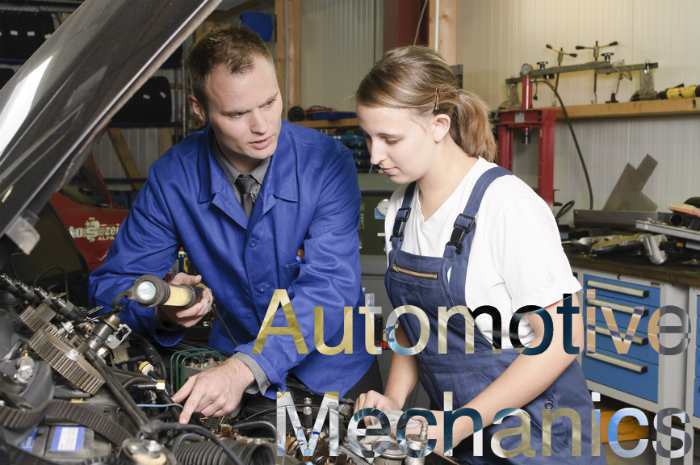How to becoming an auto mechanic. What are the salary expectations and career outlook, it’s all there in this mini guide.
Auto mechanics have always been a vital part of America’s transportation infrastructure. From the Model-T to the futuristic luxury cars of the 21st century, every car will at some point need to be maintained or repaired by a qualified mechanic.
This is especially true given increasingly strict emission guidelines that have created a need to maintain cars and trucks in the best possible condition at all times.

New cars require more skills than this old Trabant needed.
Why Become an Auto Mechanic?
In today’s economy, finding a long-term and secure job that also is well compensated can seem like a nearly impossible task. However, the growing demand for auto mechanics has created an excellent job environment for those individuals who are interested in working on the various types of vehicles used in America.
In fact, as of 2012, the Bureau of Labor Statistics (BLS) estimated that there were over 701,000 auto mechanics employed in America. That number is expected to grow to over 761,000 by 2022. When this growth is combined with job attrition due to illness, age and other factors, is creates very promising employment opportunities for newly qualified auto mechanics.
Auto Mechanics and Salary Levels
American auto mechanics are paid in a variety of manners. While some auto mechanics are paid on an hourly basis, many currently receive yearly salaries. In addition, self-employed auto mechanics usually pay themselves out of the net profits of their business.
Currently, the BLS estimates that the annual median pay rate for American auto mechanics is approximately $36,600. However, the top 10 percent earn over $60,000 while the bottom 10 percent earns about $20,000. In addition, many auto mechanics enjoy excellent benefits, including health insurance, paid vacation time and retirement benefits.
In general, an auto mechanic’s salary level will be determined by his or her experience and education, the local demand for auto mechanics and whether or not the auto mechanic is possessed of high-demand skills. In addition, auto mechanics who obtain various types of certification from private or public authorities may find themselves enjoying higher pay levels and better promotion opportunities.

Types of Careers for Auto Mechanics
There are a wide range of specific career paths available to qualified auto mechanics. These careers can range from working as a self-employed mechanic to being part of a large corporate team.
The specific career a mechanic chooses can dramatically impact his or her duties and salary options.
Self-Employed Mechanics
Self-employed mechanics either own their own shop or provide their services to their clients at the work site. In many cases, the self-employed auto-mechanic may have a group of loyal customers that he focuses on. Perhaps the most common example of this career path is the iconic American neighborhood garage.
This career decision has many advantages. The auto mechanic is in complete control of every aspect of his or her business, allowing for a great deal of professional and personal flexibility. This can be especially useful for a mechanic who is seeking to “put down roots” in both a business and personal sense in a community.
However, becoming self-employed is a major decision. A self-employed mechanic will have to focus on all aspects of his or her business, from ordering parts to dealing with payroll issues. This can prove to be an exhausting responsibility. Finally, most states have a variety of rules that can impact self-employed individuals, which may require extensive research to understand. The greater responsibility can prove to be a burden that not all individuals can tolerate.
Corporate Employment
Many auto mechanics are employed by large and small businesses. In some cases, they are hired in order to provide maintenance services for the company’s vehicles. In other cases, the company provides auto repair services to the public or other companies.
Depending on the size and orientation of the company, individual auto mechanics may work in a specialty area, such as provide brake or steering system repairs, or have more general automotive repair responsibilities.
The primary advantage of working for a company is the fact that the auto mechanic can focus solely on his or her duties, comfortable in the knowledge that the company will handle every other area.
This eliminates the need for the mechanic to focus on areas that he or she may not be trained in. Finally, a team of workers allows the entire group to share the workload, which can ensure that no single individual finds him or herself overworked on a regular basis.
However, working as an employee in a large establishment can often result management having an impersonal feel. A mechanic who is part of a large team may find it difficult to have his or her concerns adequately addressed by the employer.
In addition, large businesses often prefer to hire individuals with experience or certifications, which can make obtaining a job difficult for someone who has just entered the field of auto repair.
Working for the Government
Local, state and federal government agencies often have a need for skilled auto mechanics. Individuals working for these agencies will be paid according to the agencies civil servant standards and often enjoy a high degree of job security.
Entering the armed services can help an individual obtain a great deal of training in the field of automotive repair. This can be especially useful for those individuals who do not have the resources to attend college or a vocational school on their own.
In addition to on the job training, the armed services often provide their members with attractive educational benefits that can help the soldier improve his or her education in the field of automotive repair. However, joining the military is a serious decision and anyone thinking of this path should be certain that they understand the consequences of this decision.
What Does an Auto Mechanic Do?
- Auto mechanics repair, diagnose and perform preventative maintenance on private, business and government vehicles of all types. Where one mechanic may work on diesel powered luxury vehicles, another may focus on repairing a construction businesses heavy equipment. Other auto mechanics provide general services for a wide range of vehicle types.
- According to the Bureau of Labor Statistics (BLS) and other authorities, auto mechanics perform the following services:• Auto mechanics make use of computerized diagnostic equipment to identity mechanical problems in a vehicle. Older vehicles may require the mechanic to utilize non-computerized diagnostic techniques.
- They perform basic maintenance and care, including tune-ups, checking oil and other fluid levels and rotating the vehicle’s tires. These tasks are usually performed on a regular schedule determined by the vehicle’s age, type and general usage.
- Repair and replace parts that are worn out or have broken down.
- In states that mandate emission checks before a car can be registered, the mechanic will verify that it is currently up to code. If the vehicle is not, then the mechanic will adjust or repair the vehicle’s emission control system in order to bring it up to the state’s emission standards.
- Work on other vehicle systems, including electrical, climate control, safety and radio systems. In many cases, these systems will have their own diagnostic and repair requirements.
The Importance of Communication
One of the most important responsibilities of any mechanic is effectively communicate with his or her clients. This includes informing them of any problems that might exist with their vehicle and what the needed corrective measures will be.
In addition, the mechanic must provide an accurate estimate of short and long-term costs to his or her clients. This can help the owner evaluate whether or not the car is worth repairing.
Effective communication skills are especially vital for self-employed mechanics who will usually be directly interacting with their clients.
Becoming an Automotive Mechanic
There are several different paths to becoming an automotive mechanic.
Today, most employers prefer mechanics who have some degree of formal education, but there are still to become a qualified auto mechanic via on the job training or an apprenticeship.
Currently, no state has mandated any licensure requirements for auto mechanics, although individuals who own their own business may have to obtain a business license or other certificate before they can offer automotive repair services to their customers. Private certification programs exist for those auto repair specialists who desire to demonstrate a high level of competency in their field.
Formal Training Programs
Auto Mechanic Training
There are a wide range of training programs available to individuals interested in becoming an auto mechanic. Most programs are offered by community colleges, vocational training programs and some adult education programs. Depending on the nature of the program, the student may complete it in as little as several months or it may take as long as two years to finish.
These programs include a wide range of academic and hands on training courses that are designed to teach the students all of the skills they will need to provide effective auto repair services to their employers and clients. In addition, because the automotive repair technology is a rapidly evolving field, these programs can help ensure that their students are knowledgeable with the current state of the art in automotive technology.
In many cases, these programs may be associated with local businesses that can provide the students with internships or apprenticeships to further enhance their educational experience.
Associate’s, Bachelor’s and Graduate Degree Programs
While many automotive repair programs confer a certificate of completion, some programs can offer a higher degree to the successful graduate. Many community colleges offer automotive repair training programs that can also award an associate’s degree to program graduates.
This degree can be used to secure entry into a four-year college, in addition to providing a wider education than a focused automotive repair program. This degree can be especially useful for a student who is seeking to enter a four-year college. In addition, a student who has not obtained a high school diploma will find the possession of an associate’s degree vital when it comes time to enter the job market.
Higher degree levels are usually reserved for individuals who are seeking to become managers or design engineers instead of automotive repair mechanics. While these jobs often pay very well, they can also be difficult to obtain without a great deal of experience and training.
Anyone seeking a higher degree in automotive repair or design should consult with their school’s academic adviser before making any final decisions.
On the Job Training
While it is rarer today than in the past, many auto mechanics are trained while working. On the job training generally involves the trainee working alongside a skilled mechanic.
As the trainee becomes more proficient in the field of automotive repair, the employer will allow him or her to accept greater responsibilities. Eventually, the trainee will be considered a fully qualified auto mechanic.
This technique is most commonly used in smaller garages, especially those owned by a single family. Some large companies will also provide on the job training, but they will often mix that with traditional classroom courses in order to ensure that their trainees receive the best possible education.
While this training method can produce highly qualified auto mechanics, it has a number of disadvantages in today’s business world.
Most importantly, many employers prefer to hire workers who can document their training at a formal institution that has been accredited by state or private agencies.
In addition, should the company where the mechanic was trained go out of business, he or she may be unable to provide any proof of training. Finally, depending on the nature of the training, the trainee may find that their education has large gaps, especially concerning cutting-edge developments in automotive technology.
Ultimately, becoming an automotive mechanic can be an excellent choice in today’s competitive economy. For those who are interested in a secure career that involves a great deal of hands-on work, becoming an auto mechanic can be a rewarding personal and professional decision.

